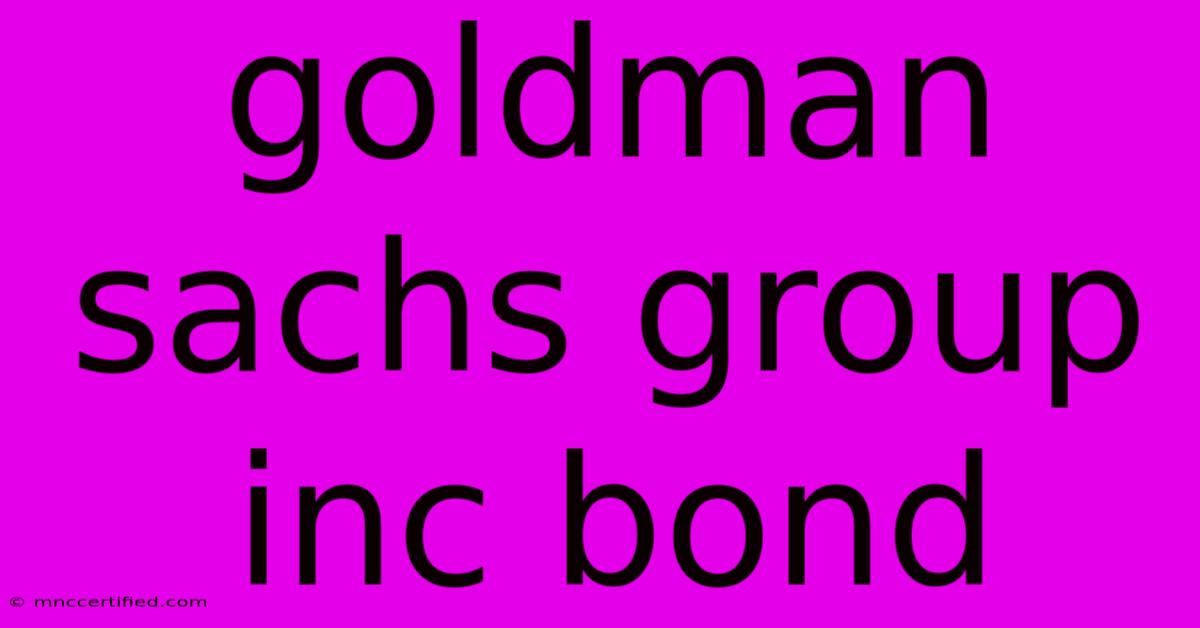Goldman Sachs Group Inc Bond

Table of Contents
Goldman Sachs Group Inc. Bonds: A Deep Dive for Investors
Goldman Sachs Group, Inc. (GS) is a global investment banking, securities, and investment management firm. Its bonds represent a significant segment of the fixed-income market, offering investors exposure to a highly rated financial institution. This article delves into the intricacies of Goldman Sachs bonds, exploring their characteristics, risks, and potential benefits for different investor profiles.
Understanding Goldman Sachs Bonds
Goldman Sachs issues a variety of bonds, each with its own unique features and risk profile. These typically include:
-
Corporate Bonds: These are debt securities issued by Goldman Sachs to raise capital. They offer a fixed or floating interest rate (coupon) and mature on a specified date. The creditworthiness of Goldman Sachs directly impacts the bond's yield and risk. Investors should carefully consider the bond's maturity date, coupon rate, and credit rating before investing.
-
Senior Unsecured Bonds: These bonds represent a higher claim on Goldman Sachs' assets in case of bankruptcy than subordinated debt. This makes them generally less risky, though still subject to market fluctuations.
-
Subordinated Debt: This type of bond has a lower priority claim on assets in a bankruptcy scenario than senior unsecured bonds. As a result, they often offer a higher yield to compensate for the increased risk.
Key Factors to Consider
When assessing Goldman Sachs bonds, several key factors are crucial:
-
Credit Rating: Agencies like Moody's, S&P, and Fitch regularly rate the creditworthiness of Goldman Sachs. A higher rating (e.g., AAA or AA) suggests a lower default risk and typically translates to lower yields. Checking the current credit rating is vital before any investment.
-
Interest Rate (Coupon): This is the annual interest payment expressed as a percentage of the bond's face value. It's a crucial component of your potential return. Higher coupon rates usually come with higher risk.
-
Maturity Date: This is the date on which the bond's principal is repaid. Longer maturities generally offer higher yields but carry greater interest rate risk. Understanding your investment horizon is critical in choosing a suitable maturity date.
-
Yield to Maturity (YTM): This represents the total return an investor can expect if the bond is held until maturity, considering the coupon payments and the difference between the purchase price and face value. YTM is a key metric for comparing different bond investments.
-
Market Conditions: Interest rates and broader economic conditions significantly impact bond prices. Rising interest rates generally lead to falling bond prices.
Risks Associated with Goldman Sachs Bonds
While Goldman Sachs is a financially strong institution, investing in its bonds still carries inherent risks:
-
Interest Rate Risk: Changes in prevailing interest rates directly affect bond prices. Rising rates typically reduce bond values.
-
Credit Risk (Default Risk): Although unlikely, there's always a risk that Goldman Sachs could default on its debt obligations.
-
Inflation Risk: Inflation can erode the real return on your investment.
-
Market Risk: Broader market downturns can negatively impact bond prices, even for high-quality issuers.
Goldman Sachs Bonds vs. Other Investments
Compared to other investment options, Goldman Sachs bonds offer a different risk-reward profile. They may provide a relatively stable income stream compared to equities, but their returns might be lower than higher-risk investments. Careful consideration of your personal risk tolerance and financial goals is essential.
Conclusion: A Strategic Investment?
Goldman Sachs bonds can be a valuable part of a diversified investment portfolio, offering a potentially stable income stream and relative safety compared to riskier assets. However, thorough research and understanding of the associated risks are paramount. Consult with a financial advisor to determine if Goldman Sachs bonds align with your investment objectives and risk tolerance. Remember to always carefully analyze the specific terms and conditions of any bond before investing. Monitoring the credit rating and market conditions is crucial for informed decision-making.

Thank you for visiting our website wich cover about Goldman Sachs Group Inc Bond. We hope the information provided has been useful to you. Feel free to contact us if you have any questions or need further assistance. See you next time and dont miss to bookmark.
Featured Posts
-
What Is A Secured Bond In Nc
Nov 30, 2024
-
2024 College Football Boise Vs Oregon State
Nov 30, 2024
-
California Tax Preparer Bond
Nov 30, 2024
-
Mulherns Tough Year From Pizza Express Collapse To
Nov 30, 2024
-
Shedeur Sanders 28 Year Record Broken
Nov 30, 2024